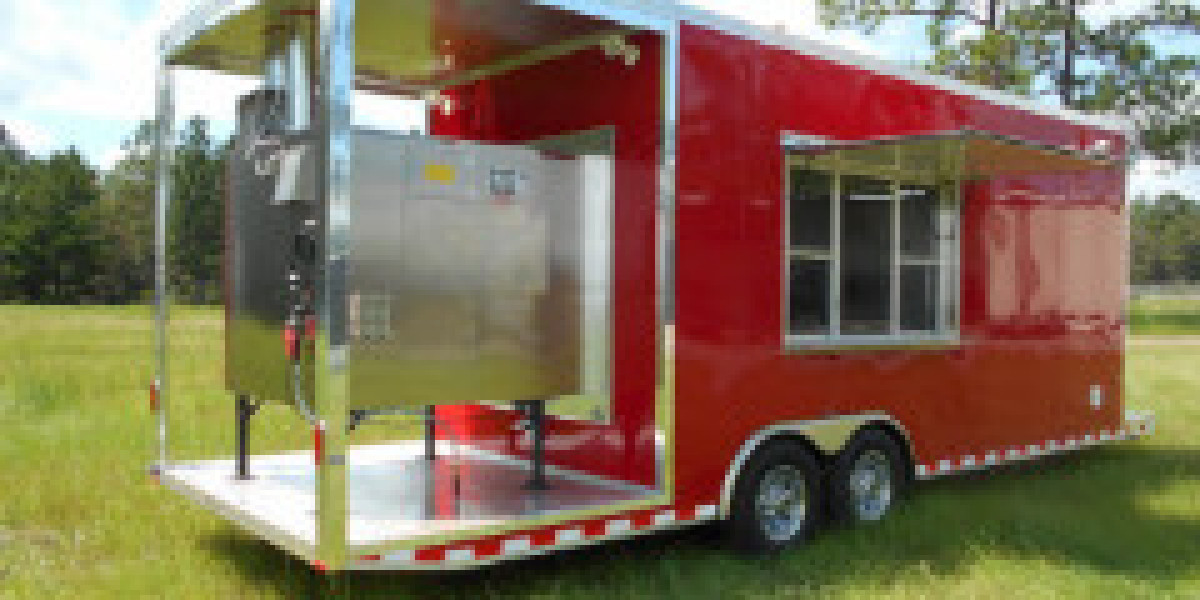Concession trailers have become an integral part of the food and beverage industry, providing entrepreneurs with the flexibility to serve customers in various locations. Whether it's a food festival, a busy street corner, or a sporting event, concession trailers offer a mobile solution for food service that is both efficient and cost-effective. If you're considering starting your own food business or looking for an expansion strategy, a concession trailer could be the ideal choice. In this article, we'll explore everything you need to know about concession trailers—from their advantages to factors to consider before purchasing one.
What Is a Concession Trailer?
A concession trailer is a mobile unit equipped with the necessary appliances and utilities to prepare and sell food, beverages, or other goods. Unlike food trucks, which are self-propelled vehicles, concession trailers need to be towed by another vehicle, such as a truck or SUV. These trailers are often seen at outdoor events, festivals, fairs, and even in fixed locations as a part of a business strategy.
Concession trailers come in various sizes and designs, ranging from compact models to larger ones that can serve a full kitchen’s needs. They can be customized to fit the specific requirements of the food or product you're selling. Some are designed for serving beverages, while others are equipped to handle everything from grilling burgers to baking pizzas.
Types of Concession Trailers
Concession trailers vary based on the type of food service offered. Here are some of the most popular types:
- Food and Beverage Trailers: These are the most common types of concession trailers, designed specifically for preparing and serving food and drinks. They can include specialized equipment such as deep fryers, grills, refrigeration units, and sinks.
- BBQ Trailers: A BBQ concession trailer comes with specialized equipment like smokers, grills, and warming units to cook and serve barbecued meats.
- Dessert Trailers: Popular at events like fairs and carnivals, dessert trailers focus on treats like ice cream, churros, or funnel cakes. They usually feature freezers, whipped cream dispensers, and fryers for specialty items.
- Beverage Trailers: These trailers are specialized for serving drinks, ranging from coffee and smoothies to alcoholic beverages like craft beer or cocktails. They often include refrigeration units, ice makers, and blenders.
- Mobile Kitchens: Larger concession trailers that offer the full functionality of a traditional restaurant kitchen, mobile kitchens can prepare a variety of food items. They include multiple cooking stations, ovens, fryers, and refrigeration units, making them a versatile option.
The Advantages of Owning a Concession Trailer
- Lower Initial Investment
Starting a brick-and-mortar restaurant can require a substantial financial investment for real estate, furniture, utilities, and staffing. In contrast, a concession trailer allows you to enter the food service industry at a much lower cost. The price of a trailer can range from $15,000 to $100,000, depending on size, equipment, and customization.
- Mobility and Flexibility
One of the greatest benefits of owning a concession trailer is mobility. You can take your business to where the crowds are. Whether it’s a local festival, fair, or a busy downtown area, the flexibility to change locations ensures you’ll always be where the customers are. Additionally, you can experiment with different areas to find the most profitable spots, avoiding the overhead costs associated with a permanent location.
- Seasonal Business Opportunities
Concession trailers thrive during the warmer months when outdoor events are plentiful. For entrepreneurs who don't want to run a year-round business, a concession trailer offers the flexibility to operate seasonally. Many owners take advantage of high-traffic periods like summer festivals, concerts, and sports events, maximizing their profits during these times.
- Customizable and Scalable
Concession trailers are highly customizable. You can tailor the layout, equipment, and design of your trailer to suit your business needs. As your business grows, you can upgrade the trailer or add additional trailers to your fleet. This scalability makes it easier to grow your business over time without the significant capital investment needed for a second brick-and-mortar location.
Things to Consider Before Buying a Concession Trailer
Before purchasing a concession trailer, there are several important factors to consider to ensure you're making a sound investment.
- Permits and Licensing
Operating a concession trailer requires obtaining specific permits and licenses, which vary depending on your location. Health department permits, food handling certifications, and business licenses are essential for legality and safety. Make sure to research the regulations in the area where you plan to operate.
- Customization and Equipment
Your trailer should be equipped with everything needed to run your specific food or beverage operation. Will you need grills, deep fryers, refrigeration units, or specialty equipment like ice cream machines? Consider whether the trailer comes fully equipped or if you'll need to invest in additional appliances and customization.
- Size and Layout
The size and layout of your concession trailer are critical for smooth operation. Ensure that your trailer has enough space for food preparation, serving, and storage, without being too large to manage or tow easily. A cramped kitchen can make working conditions uncomfortable, while a well-planned layout can increase efficiency.
- Towing Capacity
Since concession trailers need to be towed by another vehicle, it’s essential to ensure that your vehicle can handle the weight of the trailer, especially when fully loaded with food and equipment. The trailer’s size and weight should match the towing capacity of your vehicle.
- Maintenance and Durability
Concession trailers, like any vehicle, require regular maintenance to ensure they run smoothly. Pay attention to the build quality, materials, and craftsmanship of the trailer, as these factors will affect the longevity and reliability of your business.
Marketing Your Concession Trailer Business
Once you’ve purchased and set up your concession trailer, marketing will be essential to attract customers. Social media platforms like Instagram and Facebook are powerful tools to showcase your menu, locations, and events. Use these platforms to post engaging content, such as behind-the-scenes videos, food photos, and promotional offers.
Additionally, consider attending local events like food truck rallies, fairs, and festivals to increase your visibility. Partnering with event organizers to secure prime spots at high-traffic venues can drive foot traffic to your concession trailer.
Conclusion
Concession trailers offer a versatile and cost-effective way for entrepreneurs to break into the food and beverage industry. With lower startup costs, mobility, and the ability to customize your operation, a concession trailer can be a profitable and rewarding investment. Whether you’re looking to start a seasonal business, expand an existing restaurant, or test new markets, a concession trailer can help you achieve your business goals. However, it’s essential to carefully consider factors like permits, equipment, and maintenance before diving in. With the right planning, a concession trailer can be the key to success in the mobile food industry.



